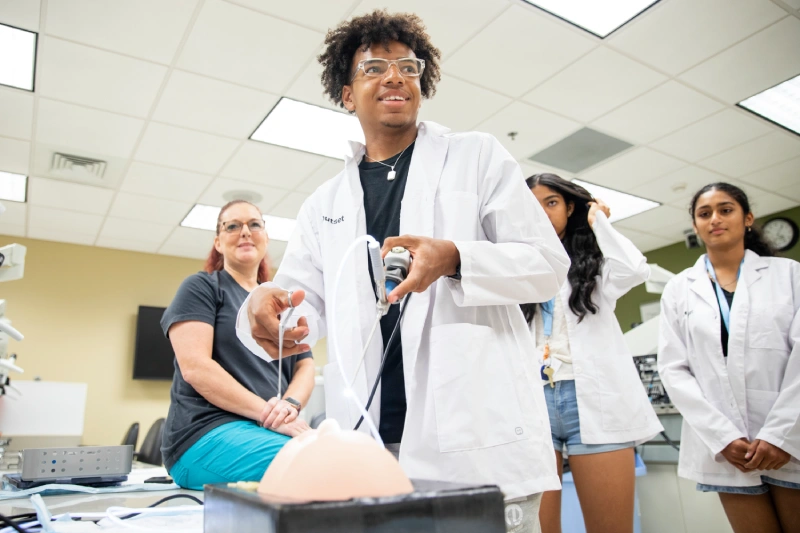Ever thought about becoming a general surgeon? It’s a tough but incredible career that lets you save lives and solve complex medical problems.
A lot of students are drawn to surgery because it’s prestigious and opens up amazing career opportunities. But keep in mind—residency is intense, and nearly half of students who start out interested in surgery end up choosing a different path because of work-life balance concerns.
If surgery sounds exciting to you, it’s never too early to start preparing. Here’s what you need to know to make it happen!
What Does a General Surgeon Do?
Understanding the role is crucial when learning how to become a general surgeon. General surgeons diagnose and treat a wide variety of surgical problems. They do much more than operate—they manage patient care before, during, and after procedures.
They evaluate patients with various conditions, determine if surgery is necessary, and create appropriate treatment plans. Their work covers nine primary areas defined by the American College of Surgeons: abdomen, alimentary tract, breast, skin and soft tissue, endocrine system, head and neck, surgical oncology, trauma care, and vascular system.
In the OR, general surgeons perform procedures like exploratory laparoscopies, appendectomies (both open and laparoscopic), cholecystectomies (gallbladder removal), hernia repairs, removal of benign soft tissue tumors, and drainage of abscesses. For complex cases, they might perform bowel resections with anastomosis applications or create stomas when needed.
The job doesn't end when surgery finishes. Post-op, general surgeons monitor patients for complications, manage their recovery, and discuss surgical outcomes with them—both good and bad findings. They also coordinate long-term follow-up care, especially for patients with ongoing post-surgical issues. Proper post-operative management is essential for the best recovery outcomes.
Education and Training: How to Become a General Surgeon
Becoming a general surgeon requires years of rigorous education and hands-on training. Here’s what each step involves:
Start with a bachelor’s degree, typically in biology, chemistry, or physics. While not mandatory, a pre-med track ensures you meet medical school prerequisites. High school students can get a head start by taking advanced science and math classes.
Next, prepare for the Medical College Admission Test (MCAT), a key requirement for medical school applications.
Medical school follows, lasting four years. The first two years focus on medical sciences, while the last two involve clinical rotations across different specialties.
After earning a medical degree, you’ll enter a general surgery residency, which requires at least five years of progressive training in accredited programs. According to the American Board of Surgery, this includes:
- A minimum of 48 weeks of full-time clinical activity each year.
- At least 54 months of surgical experience, gradually taking on more responsibility.
- Performing at least 850 procedures, with at least 200 as a chief resident.
- 40 cases in surgical critical care across seven specific categories.
Board certification requires completing courses like:
- Advanced Cardiovascular Life Support (ACLS),
- Advanced Trauma Life Support (ATLS),
- Fundamentals of Laparoscopic Surgery (FLS)
- ABS Flexible Endoscopy Curriculum.
After fulfilling these requirements, you can pursue board certification through the American Board of Surgery and a fellowship in the American College of Surgeons, building your professional network and development.
How Long Does It Take to Become a General Surgeon?
The full journey takes at least nine years after earning a bachelor’s degree:
- Medical School – 4 years for an MD or DO degree.
- General Surgery Residency – A minimum of 5 years, including:
- 48 weeks of clinical work annually.
- 54 months of surgical experience, with increasing responsibilities.
- A chief resident year with at least 200 surgeries.
- Optional Fellowship Training – 1–2 additional years in a subspecialty like trauma, colorectal, or transplant surgery.
This extensive training ensures that surgeons develop the expertise and technical skills needed for independent practice.
Skills and Qualities Needed to Become a Successful General Surgeon
Becoming a general surgeon involves recognizing the unique blend of technical expertise and interpersonal abilities required. Having steady hands and exceptional motor skills makes all the difference during intricate procedures. These mechanical skills develop progressively through training, starting with basics like suturing and knot tying.
High school students can begin developing essential skills for pre-med students by participating in summer programs like Outset. A study of surgical skills electives showed significant improvement in students' confidence with these foundational techniques.
Problem-solving abilities, communication skills, and emotional resilience are just as crucial for handling high-pressure situations. You'll need serious physical stamina too—imagine performing complex procedures for hours at a time without losing focus.
The best general surgeons also show innovation and curiosity—they're always looking for better ways to help their patients. These skills grow throughout your career as you gain more education and hands-on experience in surgical settings.
The Association of American Medical Colleges (AAMC) identifies critical skills and knowledge areas that aspiring physicians need to excel in medical school and their future careers. Its premed competency model offers a clear roadmap, helping students build a strong academic and professional foundation for success in medical education.
Average General Surgeon Salary
If you're thinking about becoming a general surgeon, you might be wondering—how much do general surgeons make? The good news is that surgeons are among the highest-paid professionals, but it takes years of training to get there.
General surgeons in the U.S. earn a median salary of $239,200 per year, according to the Bureau of Labor Statistics (BLS). However, other sources report even higher earnings. Salary.com estimates the median salary for general surgeons at $446,850 per year, showing how income can vary based on location, experience, and specialization.
The job market shows interesting trends. There's currently a shortage of surgeons, particularly in rural areas. In fact, the Association of American Medical Colleges (AAMC) projects a shortage of 15,800 to 30,200 surgeons by 2034, highlighting the increasing demand for surgical professionals in the coming years.
Challenges and Rewards of Being a General Surgeon
Setting your foot on the journey of how to become a general surgeon offers a unique mix of demands and deep satisfaction. The path begins long before treating your first patient independently, highlighting the importance of pre-med education.
Medical training is intense. After medical school, residency means working in hospitals for several years, often 60+ hours weekly while handling on-call emergencies. Burnout becomes a real risk without proper self-care. The American Medical Association emphasizes mindfulness practices and peer support to manage stress.
Fear of making mistakes under supervision can feel paralyzing when you're just starting out. Every decision affects patient outcomes, requiring a careful balance of confidence and caution. Developing this balance alongside clinical skills demands mental resilience.
The rewards, however, are incredible! There's deep satisfaction in directly improving—sometimes saving—lives. The profession offers remarkable stability and financial security. Most meaningful is the privilege of earning patients' trust during their most vulnerable moments, creating purpose that outweighs the difficulties.
Alternative or Related Careers for Aspiring General Surgeons
If you're interested in a career in healthcare but not certain that becoming a general surgeon is right for you, consider these related specialties and alternative paths:
- Trauma Surgeon: Treat acute injuries from accidents, violence, or disasters in fast-paced emergency settings where quick decisions matter.
- Cardiothoracic Surgeon: Operate on the heart, lungs, esophagus, and other chest organs. Requires 1–3 years of fellowship after general surgery residency.
- Orthopedic Surgeon: Correct deformities in bones and joints, working across multiple disciplines on various routine procedures.
- Mohs Surgeon: Use a specialized micrographic technique primarily for skin cancer, removing thin layers of cancerous tissue while preserving healthy tissue.
- Anesthesiologist: Administer anesthetics during surgeries and monitor patients' vital signs rather than performing the operations.
- Physician Assistant: Requires less training (typically a master's degree) while still letting you assist in surgeries, conduct exams, and provide care under physician supervision.
- Medical Scribe: Document patient encounters alongside physicians, gaining valuable healthcare experience while exploring options in medicine.
Steps for Teens: How to Become a General Surgeon
If you're a teen interested in becoming a general surgeon, start preparing early! Here are the key steps to set yourself up for success:
- Focus on Science and Math Courses – Take advanced biology, chemistry, and physics classes to build a strong foundation for medical school.
- Join Science and Health Clubs – Participate in STEM clubs (or start one!), pre-med programs, or volunteer at local hospitals to gain early exposure to healthcare.
- Develop Strong Study Habits – Surgery requires years of education, so practice discipline and time management to excel in challenging coursework.
- Gain Hands-on Experience – Shadow surgeons, participate in a summer program for aspiring surgeons, or intern at healthcare facilities to explore the field.
- Build Manual Dexterity – Develop steady hands through activities like playing musical instruments, sewing, or model building.
- Pursue Leadership and Volunteer Work – Join student government, lead science projects, or volunteer at community health events to demonstrate commitment to medicine.
- Research College and Medical School Requirements – Look into top pre-med programs and understand the GPA and test scores needed for medical school.
- Stay Motivated and Curious – Read about surgical advancements, watch educational videos, and seek mentors in the field to stay inspired.
Starting early gives you an advantage and helps you stand out when applying for medical school. Recognizing the advantages of early medical experience can inspire you to pursue these opportunities.
Explore a General Surgery Career with Outset
Curious about what a general surgeon does every day? Outset provides hands-on experiences in various healthcare specialties, including general surgery. Our program, in partnership with top medical institutions, gives you a firsthand look at surgical procedures, patient care, and the fast-paced hospital environment. If you're interested, click "Apply" above on our website!
Final Thoughts
Becoming a general surgeon is a long and demanding journey, but for those passionate about surgery, the rewards are well worth the effort. General surgeons play a critical role in healthcare, from mastering complex procedures to making life-saving decisions. While the path requires years of education, training, and resilience, it also offers financial stability, career fulfillment, and the opportunity to make a real difference in patients' lives.
If you're a high school student considering this career, now is the perfect time to start building a strong foundation. Take challenging science courses, seek out hands-on experiences, and explore medical summer programs to get a head start. Whether you ultimately become a surgeon or choose a related medical career, the skills and knowledge you gain along the way will serve you well in any healthcare profession.
Your journey starts with curiosity and dedication—so keep learning, stay motivated, and take the first steps toward your future in medicine!
Resources and References
The American College of Surgeons














.png)








